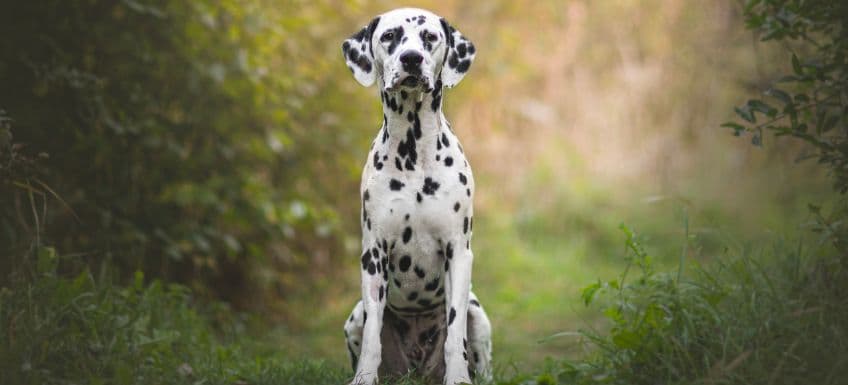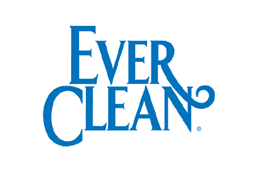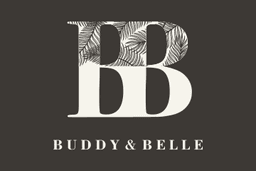Dalmatian

Dalmatians came from a region in central Europe known as Dalmatia, which is Croatia today. They were known as Coach dogs for their role in guarding coach carriages. The English became captivated by their breed and Dalmatians were given the nicknames “English coach dog” and “plum pudding dog” due to the resemblance of the traditional British holiday dessert.
The Dalmatians became quite the status symbol to have travelling alongside horse drawn carriages, and their temperament was well suited to work with the hardworking equines. With their unique appearance, they soon became a popular show dog throughout Europe. They had various roles as hunting dogs, guard dogs, war dogs, and in the United States, firefighting dogs.
| Characteristic | Detail |
|---|---|
| Origin | Croatia |
| Dog Breed Group | Hunting, guarding |
| Height | 58-61cm |
| Weight range | 20-31 kgs |
| Colours | White with black or brown spots |
| Life expectancy | 11-13 years |
| Coat | Short, velvety and fine |
| Temperament | Agile, stoic, loyal |
| Exercise requirements | Active |
| Best suited for | Families or individuals with time to give them company and attention |
| Apartment friendly | Better suited to larger properties |
Personality
Dalmatians are famously energetic and alert. Born to run for miles on end they have high stamina and would suit a household with members keen to take them for runs or bike rides. They’re intelligent and loyal to their family but can be wary of strangers.
Training and socialisation from an early age with other people, pets, and animals is a wonderful way to teach them how to appropriately greet an unfamiliar face.
Apartment living may cramp the Daly’s style, and they may be better suited to a property with a backyard to have a romp around in.
Dalmatians have humorous, quirky personalities and with the right amount of exercise and training make wonderful family members in an active household.
Grooming
With a short, fine coat that sheds, Dalmatian are quite low maintenance but weekly brushing will help remove shedding hairs and help keep the skin and coat healthy.
It is important to ensure your pet is on flea and tick control year-round to prevent parasites.
Feeding
Dalmatians have a known issue where they produce high levels of uric acid in their urine and blood which can result in urinary stones and other issues, so always follow your Vet’s advice as to the most appropriate food to feed your Daly for optimal health.
Also take into consideration your pets age and follow feeding guides found on the product to ensure they are receiving adequate nutrition.
Ensure your dog has fresh, clean water always.
Common Health Concerns
Dalmatians are prone to several common health issues, including deafness, which affects about 10-12% of the breed, and urinary stones due to their unique metabolism. They are also susceptible to skin allergies and hip dysplasia which can cause pain and movement difficulties. Regular vet check-ups, a balanced diet, proper hydration, and genetic testing by responsible breeders can help manage and prevent these conditions
Did you know?
When Dalmatian puppies are born, their coat is usually completely white. They do have their spots, but they are on their skin! The coat starts to develop its trademark spots when they are around two weeks old.
Dalmation FAQs
Where can I get a Dalmatian?
Although they are a pure breed of dog, it may be possible to find a Dalmatian through a breed specific rescue organisation or shelter. It’s always a great idea to check your local animal shelters, rescue groups and humane societies where you may just find a wonderful medium dog who is in need of a forever home.
Do Dalmatians bark a lot?
As natural guard dogs they are often on duty and will likely bark at unusual sounds or someone at the door, but with adequate exercise, entertainment and training Dalmatians do not tend to be excessive barkers.
Are Dalmatians easy to toilet train?
Positive, reward-based training is beneficial with Dalmatians. Each puppy is unique, and some will pick up toilet training quicker than others. Start early, be patient and your pup will get into the swing of things! Visit this link for more information on toilet training your puppy.
Are Dalmatians indoor or outdoor?
Dalmatians love to run and play and are probably better suited to larger properties than in apartments but will gladly join you inside for a spot of TV during their downtime.
Giving your pup plenty of exercise, company, and fun toys to play with helps to reduce the likelihood of undesirable behaviour such as excessive barking or chewing on the wrong things.
Can you leave a Dalmatian home alone?
Dalmatians prefer to have a companion home with them for attention. If you must leave your pup alone make sure they have been exercised and have a variety of things to play with while you are gone.
How much should you exercise a Dalmatian?
With lots of stamina and energy, they do well with a running or biking partner, or at sport like agility. Dalmatians can happily exercise for hours a day and will likely thrive in an active environment.
Who is best suited for a Dalmatian?
An active household with time to give them plenty of company and play time.




























